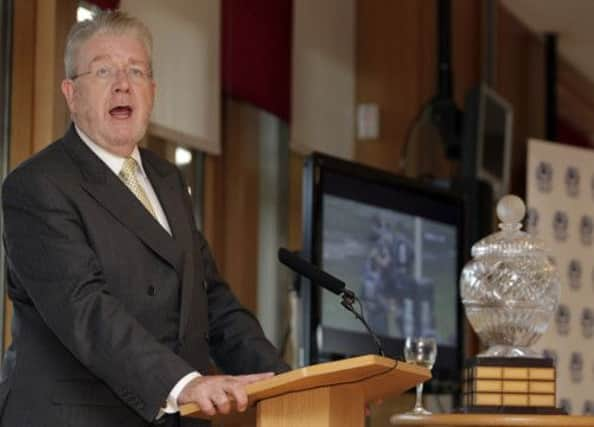University focus could brand colleges second-rate


The study from think-tank Reform Scotland claims the Scottish Government’s commitment to widening access to higher education may have a detrimental impact on colleges.
Its report, A New Deal for Scotland’s Colleges, makes a series of recommendations about how to improve the sector, including removing colleges’ status as public bodies and establishing them as fully independent charities.
Advertisement
Hide AdAdvertisement
Hide AdColleges are currently undergoing a major transformation as the Scottish Government seeks to refocus further education on delivering vocational courses for people aged 16-19.
While the further education sector has seen its budget cut, universities have received more government money in return for encouraging more students from deprived backgrounds to take up a place.
The Reform Scotland report, which is published today, said an “unintended consequence” of the policy could be to place “too great an emphasis” on going to university, reinforcing the suggestion that college was “a lesser choice”.
The report states: “There is a danger that placing too great an emphasis on university could reinforce the suggestion that college is a lesser choice and diminish the standing of FE [further education].
“Further, making funding decisions which place greater emphasis on universities to the detriment of colleges could, unintentionally, harm the very people the Scottish Government is trying to help.”
The report notes that while just 11 per cent of students at university in Scotland in 2011-12 came from the poorest 20 per cent of homes, the figure for colleges was 28 per cent.
The report calls for colleges to be independent charities contracted by the Scottish Government to carry out certain functions. The change would put them on a similar footing to universities, the report argues.
Reform Scotland’s director Geoff Mawdsley said: “The further education sector is already too centralised … For them to flourish, they must be made truly independent using primary legislation, a change that will encourage diversity and meet public need more effectively.”
Advertisement
Hide AdAdvertisement
Hide AdJohn Henderson, chief executive of umbrella organisation Colleges Scotland, said: “The college sector still sometimes faces a challenge in achieving parity of esteem with universities in how potential students, government and business view the sector. As this report shows, colleges are not a second or lesser option. We would welcome further debate on the report’s recommendations.”
A spokesman for the Scottish Government said: “Colleges have a crucial role to play in widening access since that is where many under-represented learners go to after they leave school and rightly take great pride in developing learners so that they are ready to matriculate to university.”
Big rise in number of teachers in permanent work
GROWING numbers of newly qualified teachers are managing to secure full-time permanent jobs in Scotland’s schools, a survey has found.
A poll carried out by the General Teaching Council for Scotland (GTCS) showed 45.1 per cent of respondents were in permanent full-time employment nine months after completing their guaranteed probationary year, up from 24.9 per cent last year.
The response rate was just 16 per cent. Just 9.8 per cent of newly qualified teachers were unemployed, said the survey, down from 12 per cent last year.
Anthony Finn, chief executive of the GTCS, said: “It is very encouraging to see the number of probationers finding full-time permanent employment rising significantly.”
Minister for learning, science and Scotland’s languages, Dr Alasdair Allan said: “I am delighted that the number of new teachers in employment is continuing to rise.”
Independent body to rule on closure of rural schools
AN INDEPENDENT adjudicator will be used to rule on controversial rural school closures after the Scottish Government lost a lengthy legal battle over education provision in the Western Isles.
Advertisement
Hide AdAdvertisement
Hide AdAnnouncing his response to the Commission on the Delivery of Rural Education in the Scottish Parliament yesterday, education secretary Mike Russell said he planned to hand the final decision on disputed closures to an arms-length body.
Last month, the Scottish Government failed in a legal bid to prevent Western Isles Council closing Carloway Primary on Lewis and end first and second-year secondary education at Shawbost on Lewis.
Mr Russell said he intended to establish a mechanism which would allow a third party to have the final say after the Scottish Government had called in a decision by a local authority.
He also said he would accept the vast majority of the recommendations in the final report of the Commission on the Delivery of Rural Education, which was published in April.
However, he said he would not accept a recommendation which would lessen the need to show educational benefit in the consideration of a closure.
He said: “I will be taking the steps necessary to implement the vast majority of the recommendations through a mixture of administrative and legislative change to ensure the policy parliament intended when it unanimously passed the 2010 Act is effectively delivered.
Mr Russell said he remained “open minded” about how the mechanism would work, but said an arms-length body would help remove allegations of “political bias”.
However, Labour MSP Neil Findlay said: “Who will this body be accountable to, and who will appoint the members? What’s being proposed here is scandalous. It’s political cowardice to remove the responsibility from directly elected councillors and instead of taking the decision himself, he wants to hand it to a new quango.”
READ MORE